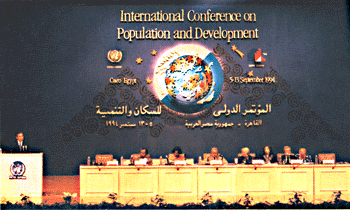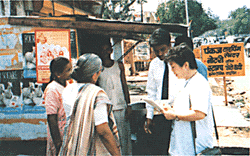Japan's Global Issues Initiative (GII) on Population and AIDS

International Conference on Population and Development was held to tackle population issue (1994, Cairo)
Japan will implement the "Global Issues Initiative on Population and AIDS," which will effect positive cooperation for developing countries in the sum of around US$3 billion within its Official Development Assistance (ODA) programme during the seven-year period from FY1994 to FY2000.
(1) Back ground
In view of such serious situations, it is widely recognised that the population and AIDS problems are the common issues of all humanity to be tackled immediately. Based upon this recognition, the 10th International Conference on AIDS (Yokohama), International Conference on Population and Development (ICPD) (Cairo), the AIDS Summit (Paris) and the World Women's Conference (Beijing) were held in 1994/1995. In February 1994, prior to the series of these conferences, Japan announced the "Global Issues Initiative (GII) on Population and AIDS" for cooperation to developing countries by allocating US $3 billion within ODA programmes in the fields of population and HIV/AIDS during the 7 year preriod from FY1994 to FY2000.
In each of ICPD and the AIDS Summit, Action Plans were announced. Japan is prepared to make international contribution to implement these Action Plans by promoting the GII.
(2) Comprehensive Approach
As reconfirmed in ICPD and the World Women's Conference, a comprehensive approach is important not only to curb population growth rate by promoting family planning, but also to take appropriate measures to solve fundamental issues which lead to population increase in developing countries, such as high infant and mother's mortality rate, poor hygilne situation, low level of education and status of women, poverty, etc..
In addition to direct cooperation to the population and family planning, Japan has determined to make a comprehensive approach including indirect cooperation, i.e. reproductive health and empowerment of women such as primary health care, primary education, literacy education and vocational training of women.
In the field of HIV/AIDS, as its remedy has not been established and due to the importance of preventive measures, the following areas of cooperation are to be pursued:
GII on Population and AIDS
- Direct Cooperation for Population
- Mother and child health care and family planning
- IEC (Information, Edcucation and Commucation) on Family Planning
- Population dynamics
Indirect Cooperation for Population - Primary health care
- Primary education
- Vocational training and literacy education for women
Cooperation for HIV/AIDS Pandemic - Education and information on preventive measures
- Transfer of testing technology
- Cooperation for survey and research on HIV/AIDSGII on Population and AIDS
(3) Selection of GII Priority Countries and Dispatch of Project Formulation Missions on Population and AIDS
To promote the GII, 12 priority countries out of Asia, Africa and Latin America were selected, judging from the seriousness and urgency of the problems, preparedness of the governments to receive Japan's assistance, activities of major donors and international organisations. To these priority countries, Project Formulation Missions on Population and AIDS have been dispatched. As the result of the Missions, a number of GII related projects have already been materialised.
GII Priority Countries
Asia (6 countries) : the Philippines, Indonesia, India, Pakistan, Bangladesh, Thailand (only AIDS)
Africa (5 countries) : Kenya, Ghana,Tanzania,Senegal, Egypt (only population)
Latin America (1 country) : Mexico
 Projects Formulated by Project Formulation Missions in 1994/95
Projects Formulated by Project Formulation Missions in 1994/95

Project Formulation Mission on Population and AIDS (Bangladesh)
(4)Japan-U.S. Common Agenda Cooperation with Major Donors and International Organisations
Cooperation with major donors and international organisations is regarded as one of the main pillars of the GII. The United Kingdom and Germany announced similar initiatives to the GII of about US$150 million and US$2 billion respectively on the occasion of ICPD. Japan has been maintaining close collaboration particularly with the United States since the initiation of Japan-U.S. Common Agenda (note). In addition, in the field of population and HIV/AIDS, Japan has been contributing funds to UNFPA and WHO. Bilateral-multilateral aid cooperation that provides materials of population and family planning and vaccine related materials in cooperation with UNFPA and UNICEF, has been positively promoted since its introduction in ODA schemes in FY 1994.
Note: Common Agenda is one of the pillars of the Japan-U.S. Framework Talks. The cooperation programme was established in July 1993 by Japan and the United States jointly to tackle global issues toward the 21st Century.
(5)Collaboration with NGO
In the fields of population and HIV/AIDS, NGOs play an important role and collaboration with NGO is one of the main pillars of Japan's policy in GII implementation. "NGO subsidiaries", which support overseas projects by Japanese NGOs, as well as "Grant Assistance for Grass Roots Projects", which supports NGO projects in abroad regardless of nationalities, are at present main schemes of Japan's ODA. The proportion of GII projects in each of the scheme was 29% and 52% respectively in FY 1994, which shows that many NGO projects on population and HIV/AIDS were positively supported.
For the promotion of the GII, meetings between The Ministry of Foreign Affairs and NGO have been held on a regular basis since 1994 to seek futher collaboration with NGOs. As the result of the series of discussions, participation of NGO representatives in the Project Formulation Missions on Population and AIDS and training courses for human resources development of GII, etc. have been realized.

Reseach on local NGO activities by a Japanese NGO representative in the Project Formulation Mission in Population and AIDS (India)
Back to Index
